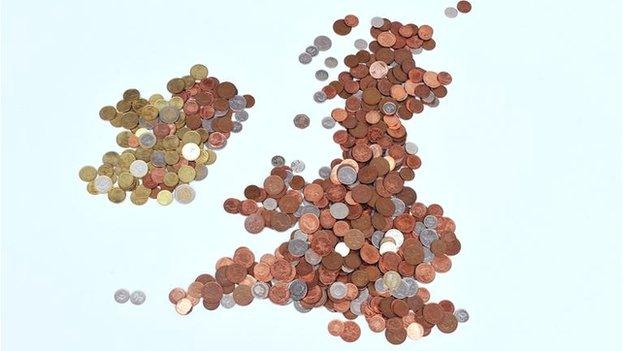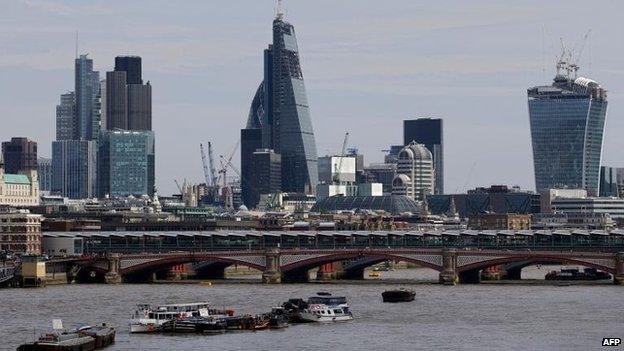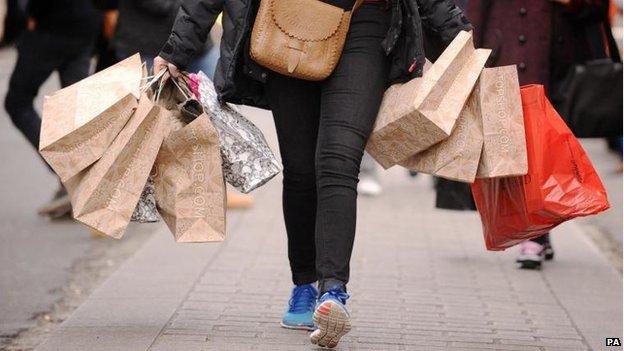Richest and poorest in the UK
- Published
- comments

There are two striking trends from data published this morning on regional gross disposable household income (stay awake) - or how much spending power people have in different parts of the UK.
The first is that London continues to power away from the rest of the UK in respect of its prosperity.
And the second is that Scottish people have not fared too badly from being part of the union since 1997 (the start date for the stats published today - and I immediately add, in deference to the passionate debate over independence, that the past is of course no guide to the future).
So Londoners were on this measure 27.7% richer than the average UK person in 2012, up from 27.6% richer in 2011 and 22.4% richer in 1997.
Or to put it another way, the income gap between London and the rest has been widening.
What is remarkable, perhaps, is that every other part of England (England, not the UK) has become relatively poorer since 1997.
Even South-Easterners became poorer - although they remain 14% richer than the UK average.
The poorest part of England - and the second poorest part of the UK - is the North East, where individuals' gross disposable household income per head is £14,393, compared with £21,446 in London.
That said, there was a bit of a catch up in the North East between 2011 and 2012.

London is continuing to power away from the rest of the UK in respect of its prosperity
Anyway, perhaps this relative decline of the English regions is another relevant factor in the rise of UKIP.
But when it comes to whether people feel the mainstream UK parties are serving their interests, it is not just longer-run personal income trends that seem to matter.
For example, Scots have become a bit richer per head since 1997 - when their disposable income was 94.7% of the UK mean, compared with 96.9% today.
And although Scots are considerably poorer than Londoners, they are richer than those in every part of England except the East, South East and South West.
But, to state the obvious (as I so often do - sorry), the relative progress of Scotland has not in any sense stemmed rise of the SNP or the appetite of some Scots to break away from the UK.
There has also been a bit of catching up by households in Wales and Northern Ireland - although households there remain in the bottom three for disposable incomes per head.

Spending is more important to people's happiness than their incomes, ONS research suggests
It is also worth looking at the composition of incomes in different places.
In London more than 83% of disposable income comes from what the ONS calls primary resources, which are largely wages and salaries, income from self-employment, income from savings and investments and rents from properties.
Or to put it another way, Londoners have relatively low financial dependence on benefits and transfers from the state; they are relatively financially independent.
What is more, since 1997, Londoners have become self-supporting to a slightly greater extent.
By contrast, pay and the fruits of saving have been a declining proportion of disposable incomes in every other part of the UK; transfers from the state have become more important everywhere apart from London.
In Scotland, for example, primary resources were 76.1% of total resources in 1997, and fell to 73.4% in 2012.
Which implies that Scots have become more reliant on state support - although the extent to which that support has implicitly come from south of the border is hotly debated and changing, and is connected to the varying flows of tax revenues lifted from oil in Scottish waters.
That said, it is difficult to argue that Scots people have derived no income benefit from being part of the UK - although that does not say a great deal about one important question, which is whether there is a culture of financial dependence in Scotland that would be replaced by one of entrepreneurialism by separation.
Here are two other points.
A separate bit of analysis by the ONS indicates that spending is more important to people's "life satisfaction" and happiness than their incomes: what we do with our money appears to matter more to our own sense of wellbeing than what we earn.
And, for those who like league tables, the very richest bit of the UK is "inner London west", where gross disposable incomes per head are £36,963 - which is well over three times the £11,411 they have available to spend in the poorest place, Nottingham.